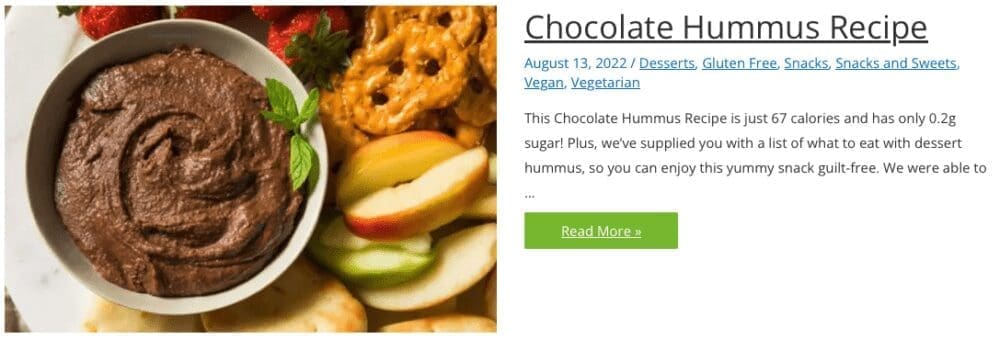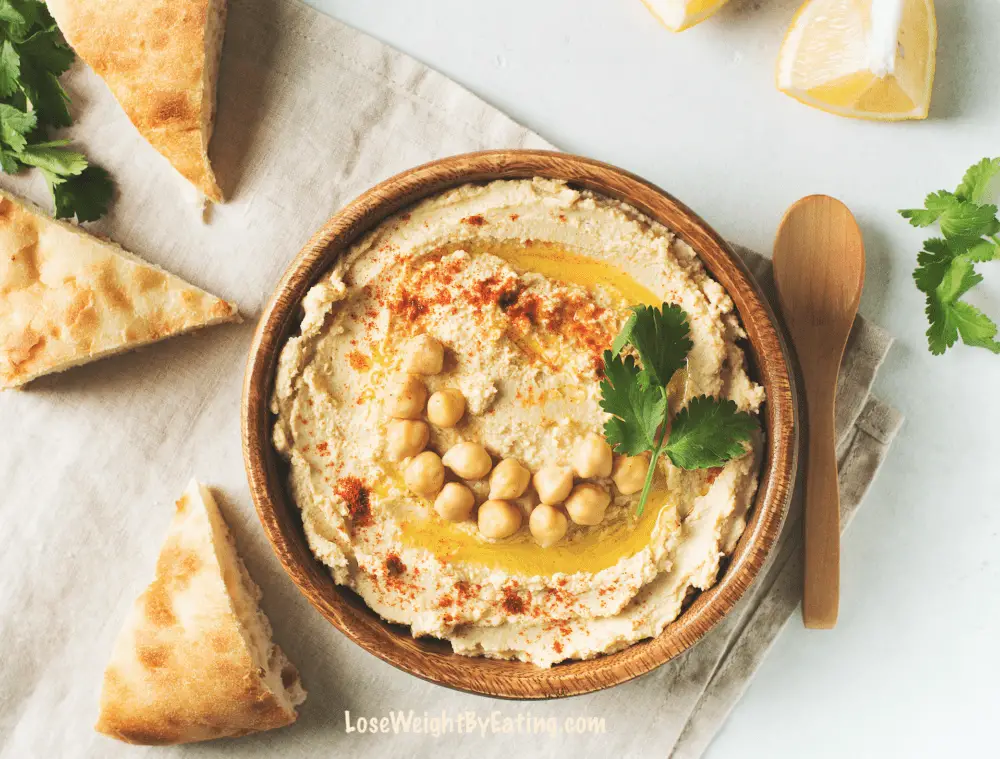In this Guide for How Many Calories in Hummus you’ll find the nutritional information. Plus the healthiest store-bought hummus brands and tips on making a healthy low calorie hummus at home.
If you’re a fan of hummus, you may be wondering about the number of calories in this tasty dip. Hummus is a popular Middle Eastern dish made from mashed chickpeas, tahini, olive oil, lemon juice, and garlic.


It’s a healthy and filling snack that’s enjoyed by millions of people around the world. However, like any food, it’s important to understand the calorie content of hummus and how it fits into your diet.
In this article, I’ll share a comprehensive guide for the calories in hummus, including how it’s made, the ingredients that impact its calorie count, and how to enjoy hummus in moderation. Let’s dive in!
Is Hummus Healthy?
Yes, hummus is considered a healthy food option. It’s a great source of protein, fiber, and healthy fats, which can help keep you feeling full and satisfied. Chickpeas, the primary ingredient in hummus, are packed with nutrients like iron, magnesium, and folate. Additionally, hummus is naturally low in saturated fat and cholesterol.
However, it’s important to keep in mind that the overall nutritional value of hummus will depend on the ingredients used and the portion size. Some store-bought hummus brands may contain added preservatives or high amounts of sodium. Additionally, if you’re consuming large amounts of hummus with high-calorie dippers like pita chips, the overall calorie count can add up quickly.
To maximize the health benefits of hummus, it’s best to choose a brand with minimal ingredients, low sodium content, and no added preservatives. Additionally, pairing hummus with fresh vegetables, such as carrots or celery, can help boost the nutritional value of your snack while keeping the calorie count in check.
Health Benefits of Hummus
Hummus has several health benefits that make it a popular food choice. Here are some of the benefits of including hummus in your diet:
- Rich in Nutrients: Hummus is a great source of several essential nutrients, including protein, fiber, and healthy fats. Chickpeas, the main ingredient in hummus, are packed with nutrients like iron, magnesium, and folate.
- Helps Manage Blood Sugar: The fiber in hummus can help slow down the absorption of glucose in the bloodstream, which can help prevent blood sugar spikes and crashes. This makes hummus a great option for people with diabetes or those looking to manage their blood sugar levels.
- May Reduce Inflammation: The ingredients in hummus, such as olive oil and garlic, have anti-inflammatory properties that may help reduce inflammation in the body. This can help reduce the risk of chronic diseases like heart disease and cancer.
- Can Aid in Weight Loss: Because hummus is high in protein and fiber, it can help keep you feeling full and satisfied for longer periods of time. This can lead to reduced calorie intake and weight loss over time.
- May Improve Digestive Health: The fiber in hummus can help promote healthy digestion by keeping the digestive system regular and preventing constipation.
- Supports Heart Health: The healthy fats found in hummus, such as olive oil, can help improve cholesterol levels and reduce the risk of heart disease.
By including hummus in your diet, you can benefit from its nutritional value and potential health benefits. Just be sure to choose a brand with minimal ingredients, low sodium content, and no added preservatives to maximize its health benefits.
How Many Calories in Hummus?
One of the primary reasons people enjoy hummus is its nutritional value. Hummus is an excellent source of protein, fiber, and healthy fats. However, it’s also important to be aware of the calorie count in hummus. A typical serving of hummus is two tablespoons, and it contains approximately 50-70 calories, depending on the brand and recipe.
Here is a breakdown of the nutritional information for a typical serving of hummus (about 2 tablespoons or 30 grams):
- Calories: 70-80
- Total fat: 5-6 grams
- Saturated fat: 0.5-1 gram
- Sodium: 125-150 milligrams
- Total carbohydrates: 4-6 grams
- Fiber: 2-3 grams
- Protein: 2-3 grams
Note that the exact nutritional content can vary depending on the specific recipe or brand of hummus. Overall, hummus is a nutritious food that is low in saturated fat and cholesterol, high in fiber and protein, and contains several essential vitamins and minerals.
What Affects the Calorie Count of Hummus?
There are several factors that can impact the calorie count of hummus, including:
- Type of Beans: The primary ingredient in hummus is chickpeas. The calorie count of hummus will depend on the type of beans used. For example, if you use canned chickpeas that are packed in oil, the calorie count will be higher than if you use dried chickpeas that have been cooked from scratch.
- Amount of Olive Oil: Olive oil is a key ingredient in hummus, and it contributes to the creamy texture and rich flavor. However, the amount of olive oil used can impact the calorie count. If you’re looking to reduce the calorie count of your hummus, try using less olive oil or using a lighter oil, such as avocado oil.
- Additional Ingredients: Hummus can be customized with a variety of additional ingredients, such as roasted red peppers, sun-dried tomatoes, or olives. While these ingredients can add flavor and nutrition, they can also add calories. Be mindful of the additional ingredients you use and how they impact the overall calorie count of your hummus.
The Healthiest Hummus Brands
When it comes to choosing a healthy hummus brand, it’s important to look for options with minimal ingredients, low sodium content, and no added preservatives. Here are some of the healthiest hummus brands to look for:
- Sabra: Sabra is a popular hummus brand that offers a variety of flavors. Their Classic hummus contains just six ingredients, including chickpeas, tahini, and olive oil. Sabra also offers a line of organic and lower-sodium hummus options.
- Cedar’s: Cedar’s is another well-known hummus brand that uses simple ingredients and no preservatives. Their Classic hummus contains just five ingredients, including chickpeas, tahini, and lemon juice.
- Whole Foods Market: Whole Foods offers a variety of hummus options that are made in-house and use simple, wholesome ingredients. Their Organic Classic hummus contains just six ingredients, including chickpeas, tahini, and olive oil.
- Roots: Roots is a smaller, artisanal hummus brand that is gaining popularity. Their hummus is made with organic chickpeas, tahini, and olive oil, and is free from preservatives and artificial flavors.
- Lantana: Lantana offers a variety of creative hummus flavors, such as beet, edamame, and black bean. Their hummus is made with simple ingredients and is free from preservatives.
By choosing a healthy hummus brand, you can enjoy the nutritional benefits of this delicious snack without any added chemicals or excess sodium.
5 Ways to Lower the Calories in Homemade Hummus
While hummus is a healthy and nutritious snack, it can also be high in calories if you’re not careful. Here are some ways to lower the calorie count in homemade hummus:
- Use less oil: Traditional hummus recipes call for a significant amount of olive oil, which can add up in terms of calories. Try reducing the amount of oil you use or swapping it out for a lower-calorie option like avocado oil or grapeseed oil.
- Use less tahini: Tahini, a paste made from ground sesame seeds, is a key ingredient in hummus. However, it can also be high in calories. Consider using less tahini or swapping it out for a lower-calorie alternative like peanut butter or almond butter.
- Add vegetables: Adding vegetables like roasted red peppers, carrots, or spinach to your hummus can add flavor and nutrition without significantly increasing the calorie count.
- Use low-fat yogurt: For a creamy, tangy hummus, consider swapping out some of the oil for low-fat yogurt. This will lower the calorie count while also adding a boost of protein.
- Use less salt: Traditional hummus recipes often call for a significant amount of salt, which can contribute to high blood pressure and other health issues. Try reducing the amount of salt you use or using a salt substitute like garlic powder or lemon juice.
By making these simple swaps, you can enjoy the delicious taste and nutritional benefits of hummus without worrying about the calorie count.
How to Enjoy Hummus in Moderation
While hummus is a healthy and nutritious snack, it’s important to enjoy it in moderation, especially if you’re watching your calorie intake. Here are some tips for enjoying hummus without going overboard on calories:
- Stick to the Serving Size: A serving size of hummus is typically two tablespoons. Be mindful of how much hummus you’re scooping onto your plate, and try to stick to the recommended serving size.
- Pair with Vegetables: Instead of dipping high-calorie crackers or chips into your hummus, try pairing it with fresh vegetables, such as carrots, cucumbers, or bell peppers. This will help you feel full and satisfied without adding a lot of extra calories.
- Make Your Own Hummus: Making your own hummus is a great way to control the calorie count and ensure that you’re using high-quality ingredients. You can experiment with different flavor combinations and adjust the amount of oil you use to reduce the calorie count.
Low Calorie Hummus Recipe
Frequently Asked Questions (FAQ)
Hummus can be high in calories if consumed in large amounts, especially if it contains added oils or other high-calorie ingredients. However, when enjoyed in moderation, hummus can be a healthy and nutritious snack.
The number of calories in a serving of hummus can vary depending on the brand and recipe. On average, one serving (2 tablespoons) of hummus contains around 70-80 calories.
The main source of calories in hummus is typically the chickpeas and added oils or tahini. To reduce the calorie count, consider using less oil or tahini and adding more vegetables or using low-fat yogurt.
While hummus can be a healthy addition to a weight loss diet, it’s important to watch portion sizes and choose lower-calorie options. Pairing hummus with fresh vegetables or whole-grain crackers can make for a filling and satisfying snack.
Final Thoughts
Hummus is a nutritious and delicious snack that can provide a variety of health benefits.
While it can be high in calories if consumed in excess, there are ways to make homemade hummus lower in calories by using less oil and tahini, adding vegetables, and using low-fat yogurt.
When enjoyed in moderation, hummus can be a great addition to a healthy and balanced diet.
By choosing the right brand or making your own at home, you can enjoy the many benefits of this flavorful and versatile dip without worrying about the calorie count.
What to Read Next:






Lose Weight By Eating Cookbooks


Share this Low Calorie Guide:



